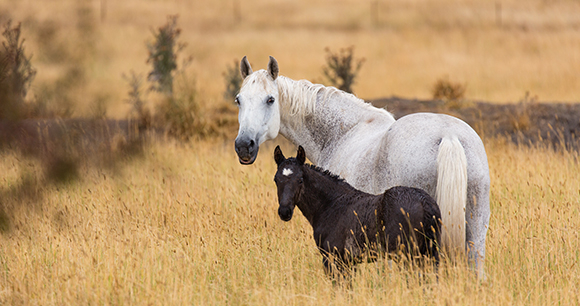
Support Legislation to Protect Horses, Donkeys, and Mules
- Contact your representative and senators and encourage them to support legislation to help horses, including the SAFE Act to end horse slaughter, the PAST Act to end horse soring, and the Wild Horse and Burro Protection Act to end helicopter roundups. The Ejiao Act, to end the sale of donkey hide gelatin, and the Horse Transportation Safety Act, to halt the use of double deck trailers to transport horses, are also important federal actions to improve equine welfare.
- Sign up for action alerts from AWI, which keep you informed about urgent animal protection issues and provide quick and easy ways to get in touch with policymakers.
- Visit AWI’s Action Center to take action on current action alerts.
- Share information on relevant equine bills with your friends and followers on social media.
Engage in Responsible Ecotourism
- Watching wild horses can be an exciting and educational experience. The vast majority of wild equines live in “herd management areas” overseen by the Bureau of Land Management in 10 western states. A smaller but still significant number live in “wild horse and burro territories” managed by the US Forest Service, while a few other wild herds occupy federal lands managed by the National Park Service or the US Fish and Wildlife Service. There are even small herds along the East Coast, in places like Assateague Island and the Outer Banks.
- Be sure to participate in “leave no trace” principles and safe wildlife watching, maintaining plenty of distance between you and the wildlife.
- Do your research before visiting—many herd areas are remote and require 4WD vehicles to access.
Volunteer with Horses
- Volunteer at a local equine rescue. Hundreds of such entities across the country rescue, rehabilitate and/or provide sanctuary to horses in need. Use the Homes for Horses Coalition directory to find an equine rescue near you.
- Support horses helping people by volunteering at a therapeutic riding center. Look for centers accredited by PATH International.
- Connect with local nonprofits working to preserve and protect wild horse herds.
- Nonprofits often welcome volunteers with diverse skills. You may be able to help with social media or grant seeking right from your own home!
Prioritize Equine Well-Being
- Do not attend unregulated horse racing at “bush tracks.” These races harbor illegal activity and place horses at extreme risk. If you know of an unsanctioned racetrack in your area, alert local law enforcement.
- Avoid riding on horse-drawn carriages in urban environments and educate yourself and your friends about why this activity is harmful to horses.
- Research equestrian tourist attractions and pack-animal programs thoroughly before participating to ensure animals are well cared for and treated with respect.
Do Not Purchase Products Containing Ejiao
- Ejiao, a donkey skin gelatin, can be found in certain Chinese products, including snacks, cosmetics, and supplements. The demand for ejiao is decimating donkey populations worldwide and contributing to enormous suffering.
- Read ingredients fully and look out for other names such as, “donkey oil,” “donkey-hide gelatin,” “donkey hide,” “donkey glue,” or “ass-hide glue.”
Support Responsible Equine Ownership
- Participate in learning opportunities in your community to increase your knowledge of equine behavior, health, and ownership.
- Be mindful of the welfare of horses and donkeys in your community and report suspected neglect or abuse to local law enforcement.